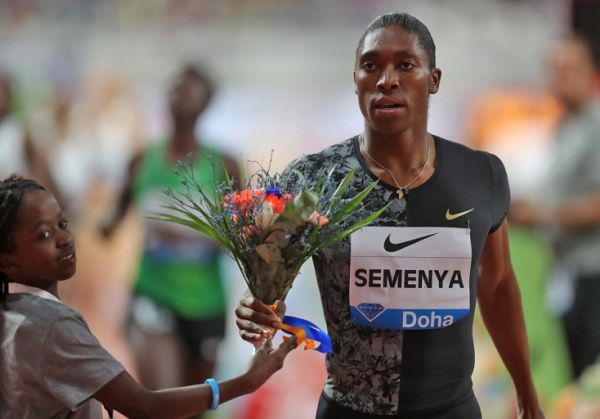South Africa Set To Appeal Caster Semenya's Testosterone Ruling
13th May 2019
The decision on May 1 by the Court of Arbitration for Sport (CAS) in Lausanne, Switzerland, means female athletes with elevated testosterone will have to take suppressive treatment if they wish to compete as women in certain events

- South Africa on Monday said it would lodge an appeal after Olympic champion Caster Semenya lost her case challenging new rules forcing female athletes to regulate their testosterone levels
- Semenya's case has provoked a furious debate across sport worldwide about gender and "hyperandrogenic" athletes, those with "differences of sexual development" (DSD)
- The IAAF argued that athletes such as two-time Olympic 800 metres champion Semenya had an unfair advantage over others
JOHANNESBURG, South
Africa- South Africa on Monday said it would lodge an appeal after Olympic
champion Caster Semenya lost her case challenging new rules forcing female
athletes to regulate their testosterone levels.
Semenya's case has provoked a furious debate across sport
worldwide about gender and "hyperandrogenic" athletes, those with
"differences of sexual development" (DSD).
The decision on May 1 by the Court of Arbitration for Sport
(CAS) in Lausanne, Switzerland, means female athletes with elevated
testosterone will have to take suppressive treatment if they wish to compete as
women in certain events.
"We'll file the appeal as soon as we possibly
can," Vuyo Mhaga, spokesman for the South African sport and recreation
ministry, told AFP.
MUST
READ: Bring On Bandari! Sharks Coach Muluya Upbeat About SportPesa Shield Final
Mhaga said the appeal, to be lodged at the Switzerland
Federal Tribunal, would be based on complaints over the judges' past record on
similar cases, lack of clarity over how the ruling could be implemented and how
the evidence was handled.
"It is not explained how the IAAF (the International
Association of Athletics Federations) is going to administer those
regulations," he said.
"We feel that the scientific information that has been
brought has been actually completely ignored and we've got a belief that a
different court will arrive at a different determination.
"Everything is being done through Athletics SA."
- Public anger -
The IAAF argued that athletes such as two-time Olympic 800
metres champion Semenya had an unfair advantage over others.
MUST
READ: Algerian Winger Mahrez Headlines Africans In Europe Review
Semenya, 28, won the 800m at the Doha Diamond League meeting
on May 3 in her first race after the ruling, saying that "actions speak
louder than words".
Asked if she intended to take hormone-suppressing treatment,
the three-time world champion said: "No way.
"I don't know what will happen next. But no one should
tell me what to do, if people want to stop me from doing something that's their
problem, not mine."
The South African government, sports bodies and fans have
reacted in fury over Semenya's case, which many in the country see as having
racist undertones.
The World Medical Association has urged doctors not to
enforce the controversial new rules, warning that attempts to do so would
breach ethics codes.
The court itself said there was insufficient evidence to
overturn the new regulations, but it "expressed some serious concerns as
to the future practical application" of the rules.
MUST
READ: David Wakhu Pleased With KCB Road To Masters Nakuru Leg Victory
The rules must remain a "living document", which
are revised based on new information, the court added.
The DSD rules -- first adopted last year but suspended
pending the legal battle -- came into effect on May 8, applying to distances
from 400m to a mile, and includes the heptathlon.
